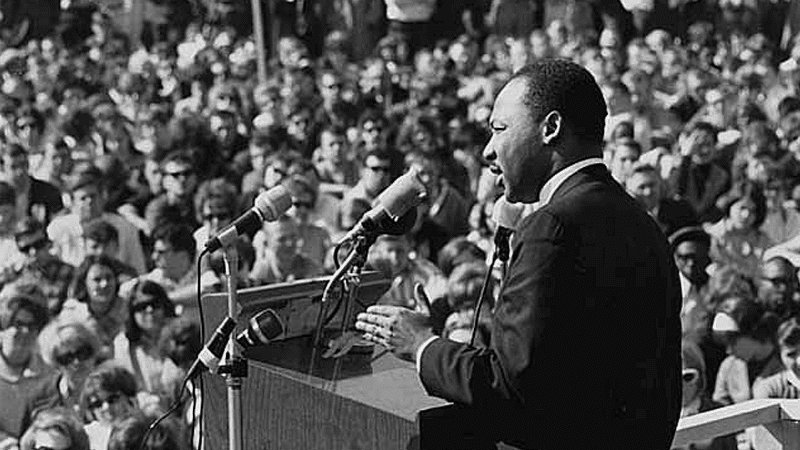Martin Luther King: A non-violent civil rights hero, driven by the cross

Dr Martin Luther King Jr, hero of the US civil rights movement, was assassinated on 4 April 1968.
The iconic activist is well known for his courageous stand to win liberty and equality for African Americans.
Dr King was fiercely non-violent in his tactics, at a time when some were encouraging violent retaliation. But few people will know that this strength of conviction was founded on his beliefs about the cross of Christ.
The cross of Christ
In his fascinating book ‘The Power of Unearned Suffering’, Pastor Mika Edmondson looks at Dr King from an evangelical perspective, drawing out the theological roots of his stand. He discusses this at length in an interview with the Gospel Coalition.
Dr King’s big motivation was the way Christ responded to suffering he didn’t deserve. He believed that following the example of Jesus, Christians should stand up for what is right but not seek to fight back or use violence.
Edmondson writes: “It was the cross of Christ which ultimately grounded King’s hope that unearned suffering is redemptive. The cross makes meaning out of unearned suffering, proving it to have a redemptive purpose and power if engaged in righteousness and as an act of sacrifice.”
“According to King, the cross is history’s greatest proof of this, providing the hope of liberation for the oppressed and a powerful motivation for freedom fighters to resist the natural tendency to meet oppression with retaliatory violence.”
Martin Luther King’s theology was seriously flawed – for example on the substitutionary atonement – and his legacy has been dogged by a serious allegation in his personal life, although it has since emerged that the FBI were trying to entrap him in a scandal. But there can be no doubt that his non-violence was rooted in his understanding of the cross.
‘Extremist’
In his final speech, delivered the day before he was shot and killed, Dr King declared: “I just want to do God’s will”, saying he had “seen the Promised Land”.
A few days later, the 1968 Civil Rights Act, a landmark piece of legislation, was passed by Congress. Tinged by the tragedy of his assassination, it was nonetheless a triumphant conclusion to Dr King’s long struggle.
History well remembers this side of the story, but what it tends to gloss over is that despite his peaceful tactics, Dr King was labelled an ‘extremist’ for his stand.
Vague ‘values’
Fast forward to 2017 and in the UK, Christians are also in danger of being labelled extremists, merely for expressing counter-cultural views.
The Government wants to introduce a new law to silence ‘non-violent extremists’ who show “vocal or active opposition to fundamental British values”.
A range of critics have warned that the plans, part of a wider counter-terrorism strategy, are so vague and wide they would catch peaceful dissenters from various walks of life – including Christians.
Law-abiding citizens
Christians should not be targeted by the Government in its attempt to tackle the real and present danger of Islamist extremism. Christians are peaceful, law-abiding citizens who follow a biblical mandate for godly living.
In addition, ideas put forward by people like Dr King, once thought seditious, dangerous, or crazy have greatly blessed Western nations. Democracy needs dissent, and silencing it undermines its very foundations.
To learn more about the Government’s controversial proposals for Extremism Disruption Orders (EDOs), Ofsted inspections of churches, an ‘Equality Oath’ and more, visit our extremism page.
